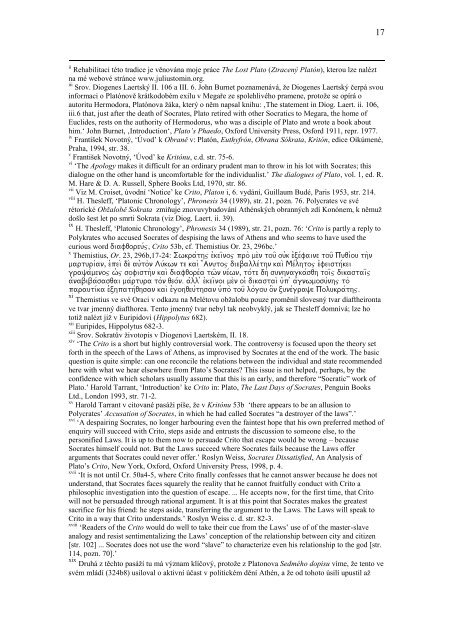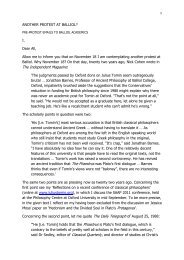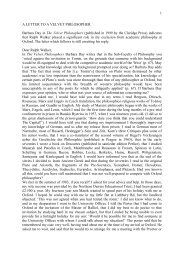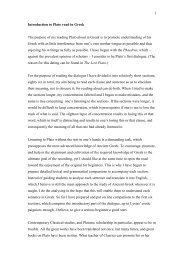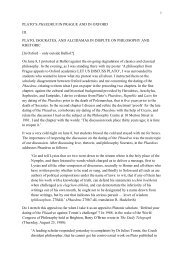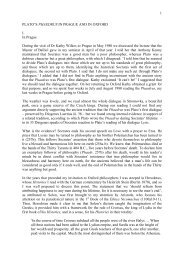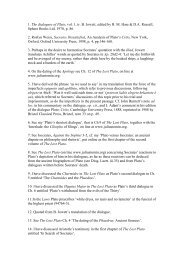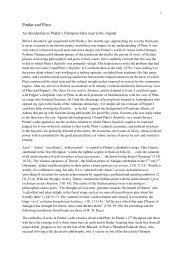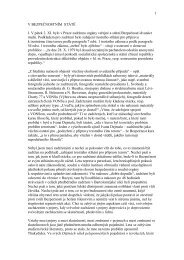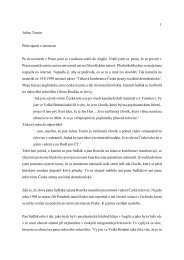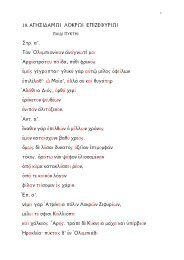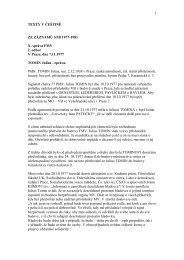1 Sokrates a zákony obce Platonovy dialogy Kritón a ... - Julius Tomin
1 Sokrates a zákony obce Platonovy dialogy Kritón a ... - Julius Tomin
1 Sokrates a zákony obce Platonovy dialogy Kritón a ... - Julius Tomin
You also want an ePaper? Increase the reach of your titles
YUMPU automatically turns print PDFs into web optimized ePapers that Google loves.
ii<br />
Rehabilitaci této tradice je věnována moje práce The Lost Plato (Ztracený Platón), kterou lze nalézt<br />
na mé webové stránce www.juliustomin.org.<br />
iii<br />
Srov. Diogenes Laertský II. 106 a III. 6. John Burnet poznamenává, že Diogenes Laertský čerpá svou<br />
informaci o Platónově krátkodobém exilu v Megaře ze spolehlivého pramene, protože se opírá o<br />
autoritu Hermodora, Platónova žáka, který o něm napsal knihu: ‚The statement in Diog. Laert. ii. 106,<br />
iii.6 that, just after the death of Socrates, Plato retired with other Socratics to Megara, the home of<br />
Euclides, rests on the authority of Hermodorus, who was a disciple of Plato and wrote a book about<br />
him.‘ John Burnet, ‚Introduction‘, Plato’s Phaedo, Oxford University Press, Osford 1911, repr. 1977.<br />
iv<br />
František Novotný, ‘Úvod’ k Obraně v: Platón, Euthyfrón, Obrana Sókrata, <strong>Kritón</strong>, edice Oikúmené,<br />
Praha, 1994, str. 38.<br />
v<br />
František Novotný, ‘Úvod’ ke <strong>Kritón</strong>u, c.d. str. 75-6.<br />
vi<br />
‘The Apology makes it difficult for an ordinary prudent man to throw in his lot with Socrates; this<br />
dialogue on the other hand is uncomfortable for the individualist.’ The dialogues of Plato, vol. 1, ed. R.<br />
M. Hare & D. A. Russell, Sphere Books Ltd, 1970, str. 86.<br />
vii<br />
Viz M. Croiset, úvodní ‘Notice’ ke Crito, Platon i, 6. vydání, Guillaum Budé, Paris 1953, str. 214.<br />
viii<br />
H. Thesleff, ‘Platonic Chronology’, Phronesis 34 (1989), str. 21, pozn. 76. Polycrates ve své<br />
rétorické Obžalobě Sokrata zmiňuje znovuvybudování Athénských obranných zdí Konónem, k němuž<br />
došlo šest let po smrti Sokrata (viz Diog. Laert. ii. 39).<br />
ix<br />
H. Thesleff, ‘Platonic Chronology’, Phronesis 34 (1989), str. 21, pozn. 76: ‘Crito is partly a reply to<br />
Polykrates who accused Socrates of despising the laws of Athens and who seems to have used the<br />
curious word diafqoreu/j, Crito 53b, cf. Themistius Or. 23, 296bc.’<br />
x<br />
Themistius, Or. 23, 296b,17-24: Swkra/thj e0kei=noj pro\ me\n tou= ou0k e0ce/faine tou= Puqi/ou th\n<br />
marturi/an, e0pei\ de\ au0to\n Lu/kwn te kai\ 1Anutoj dieballe/thn kai\ Me/lhtoj e0feisth/kei<br />
graya/menoj w(j sofisth\n kai\ diafqore/a tw~n ne/wn, to/te dh\ sunhnagka/sqh toi=j dikastai=j<br />
a0nabiba/sasqai ma/rtura to\n qeo/n. a0ll 0 e0kei=noi me\n oi9 dikastai\ u9p 0 a0gnwmosu/nhj to\<br />
parauti/ka e0chpath/qhsan kai\ e0gohqeu/thsan u9po\ tou= lo/gou o4n cune/graye Polukra/thj.<br />
xi<br />
Themistius ve své Oraci v odkazu na Melétovu obžalobu pouze proměnil slovesný tvar diaftheironta<br />
ve tvar jmenný diafthorea. Tento jmenný tvar nebyl tak neobvyklý, jak se Thesleff domnívá; lze ho<br />
totiž nalézt již v Euripidovi (Hippolytus 682).<br />
xii<br />
Euripides, Hippolytus 682-3.<br />
xiii<br />
Srov. Sokratův životopis v Diogenovi Laertském, II. 18.<br />
xiv<br />
‘The Crito is a short but highly controversial work. The controversy is focused upon the theory set<br />
forth in the speech of the Laws of Athens, as improvised by Socrates at the end of the work. The basic<br />
question is quite simple: can one reconcile the relations between the individual and state recommended<br />
here with what we hear elsewhere from Plato’s Socrates? This issue is not helped, perhaps, by the<br />
confidence with which scholars usually assume that this is an early, and therefore “Socratic” work of<br />
Plato.’ Harold Tarrant, ‘Introduction’ ke Crito in: Plato, The Last Days of Socrates, Penguin Books<br />
Ltd., London 1993, str. 71-2.<br />
xv<br />
Harold Tarrant v citované pasáži píše, že v <strong>Kritón</strong>u 53b ‘there appears to be an allusion to<br />
Polycrates’ Accusation of Socrates, in which he had called Socrates “a destroyer of the laws”.’<br />
xvi<br />
‘A despairing Socrates, no longer harbouring even the faintest hope that his own preferred method of<br />
enquiry will succeed with Crito, steps aside and entrusts the discussion to someone else, to the<br />
personified Laws. It is up to them now to persuade Crito that escape would be wrong – because<br />
Socrates himself could not. But the Laws succeed where Socrates fails because the Laws offer<br />
arguments that Socrates could never offer.’ Roslyn Weiss, Socrates Dissatisfied, An Analysis of<br />
Plato’s Crito, New York, Oxford, Oxford University Press, 1998, p. 4.<br />
xvii<br />
‘It is not until Cr. 50a4-5, where Crito finally confesses that he cannot answer because he does not<br />
understand, that Socrates faces squarely the reality that he cannot fruitfully conduct with Crito a<br />
philosophic investigation into the question of escape. ... He accepts now, for the first time, that Crito<br />
will not be persuaded through rational argument. It is at this point that Socrates makes the greatest<br />
sacrifice for his friend: he steps aside, transferring the argument to the Laws. The Laws will speak to<br />
Crito in a way that Crito understands.’ Roslyn Weiss c. d. str. 82-3.<br />
xviii<br />
‘Readers of the Crito would do well to take their cue from the Laws’ use of of the master-slave<br />
analogy and resist sentimentalizing the Laws’ conception of the relationship between city and citizen<br />
[str. 102] ... Socrates does not use the word “slave” to characterize even his relationship to the god [str.<br />
114, pozn. 70].’<br />
xix<br />
Druhá z těchto pasáží tu má význam klíčový, protože z Platonova Sedmého dopisu víme, že tento ve<br />
svém mládí (324b8) usiloval o aktivní účast v politickém dění Athén, a že od tohoto úsilí upustil až<br />
17


